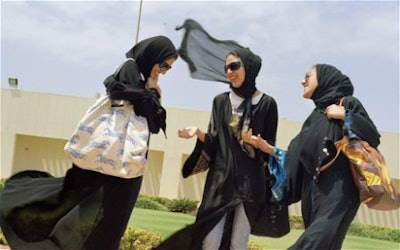
In their bags, the textbooks vary, but one item is mandatory: a floor-length black abaya robe that each must cover herself with when she steps through the university gates back to the outside world of the kingdom.
Saudi Arabia has spent billions of dollars to improve women’s education, part of a broader drive to empower young Saudis for the marketplace. That has meant improved campuses, better facilities and research programs and a slight expansion in the curriculum for women. For years, Saudi King Abdullah has been making startling, if incremental, moves to ease restrictions on women in the kingdom, where the word of strict ultraconservative Wahhabi clerics is virtually law.
But a look inside the women’s universities that have sprung up over the past decade illustrates how change only goes so far.
Within the campus grounds—a world of strictly female students, teachers and staff—women have some greater freedoms. But outside, women remain bound by a web of customs and religious strictures. Women are kept segregated from men, are barred from simple rights like driving, and are required to adhere to strict dress codes that often require them to cover their hair and face with a black veil. They are ruled by the whim of male relatives whose permission is required for a woman to work, get an education or travel under “guardianship laws.”
With those restrictions in place, women’s rights advocates say, the king’s drive to modernize the oil-rich nation will always hit a wall.
“No matter what happens, women are still bound by male guardianship laws and strict cultural norms,” said Aziza Yousef, a professor at the women’s college of King Saud University. “If you are lucky and your male guardian is good, you will move ahead in life fine. If you are in a family where the male guardian is strict, your life will be paralyzed.”




















